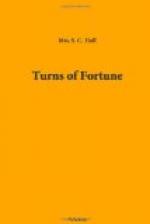“Foolish boy!” muttered Charles; “this is no time to quarrel about trifles. The fact is, Mary, that the sooner you are all out of this house the better; there are one or two creditors, not for large sums certainly, but still men who will have their money; and if we do not quietly sell off, they will force us. The house might have been disposed of last week by private contract, but your mother would not hear of it, because the person who offered was a medical rival of my poor brother.”
Mary did not hear the concluding observation; her eyes wandered from object to object in the room—the harp—the various things known from childhood. “Any thing you and your mother wish, my dear niece,” said her kind uncle, “shall be preserved—the family pictures—your harp—your piano—they are all hallowed memorials, and shall be kept sacred.”
Mary burst into tears. “I do not,” she said, “shrink from considering those instruments the means of my support; but although I know the necessity for so considering, I feel I cannot tell what at quitting the home of my childhood; people are all kind; you, my dear uncle, from whom we expected so little, the kindest of all; but I see, even in these early days of a first sorrow, indications of falling off. My aunt’s husband has really behaved very badly about the appointment of my eldest brother; and as to the cadetship for the second—we had such a brief dry letter from our Indian friend—so many first on the list, and the necessity for waiting, that I do not know how it will end.”
“I wish, my dear, you could prevail on your mother, and sister, and all, to come to Repton,” said Mr. Adams. “If your mother dislikes being in my house, I would find her a cottage near us; I will do all I can. My wife joins me in the determination to think that we have six additional children to look to. We differ from you in our habits; but our hearts and affections are no less true to you all. My Mary and you will be as sisters.”
His niece could bear no more kindness. She had been far more bitterly disappointed than she had confessed even to her uncle; and yet the very bitterness of the disappointment had been the first thing that had driven her father’s dying wail from her ears—that cry repeated so often and so bitterly in the brief moments left after his accident—“My children! My children!” He had not sufficient faith to commit them to God’s mercy; he knew he had not been a faithful steward; and he could not bring himself from the depths of his spiritual blindness to call upon the Fountain that is never dried up to those who would humbly and earnestly partake of its living waters.
It was all a scene as of another world to the young, beautiful, petted, and feted girl; it had made her forget the disappointment of her love, at least for a time. While her brothers dared the thunder-cloud that burst above their heads, her mother and sisters wept beneath its influence. Mary had looked forth, and if she did not hope, she thought, and tried to pray; now, she fell weeping upon her uncle’s shoulder; when she could speak, she said, “Forgive me; in a little time I shall be able to conquer this; at present, I am overwhelmed; I feel as if knowledge and sorrow came together; I seem to have read more of human nature within the last three days than in all my past life.”




